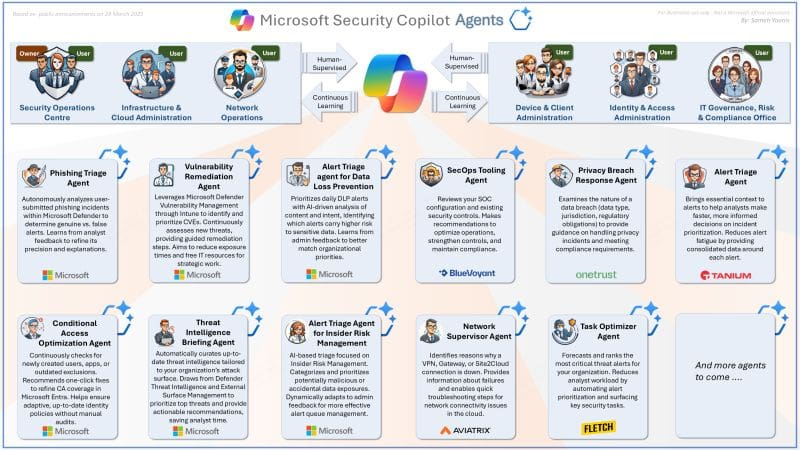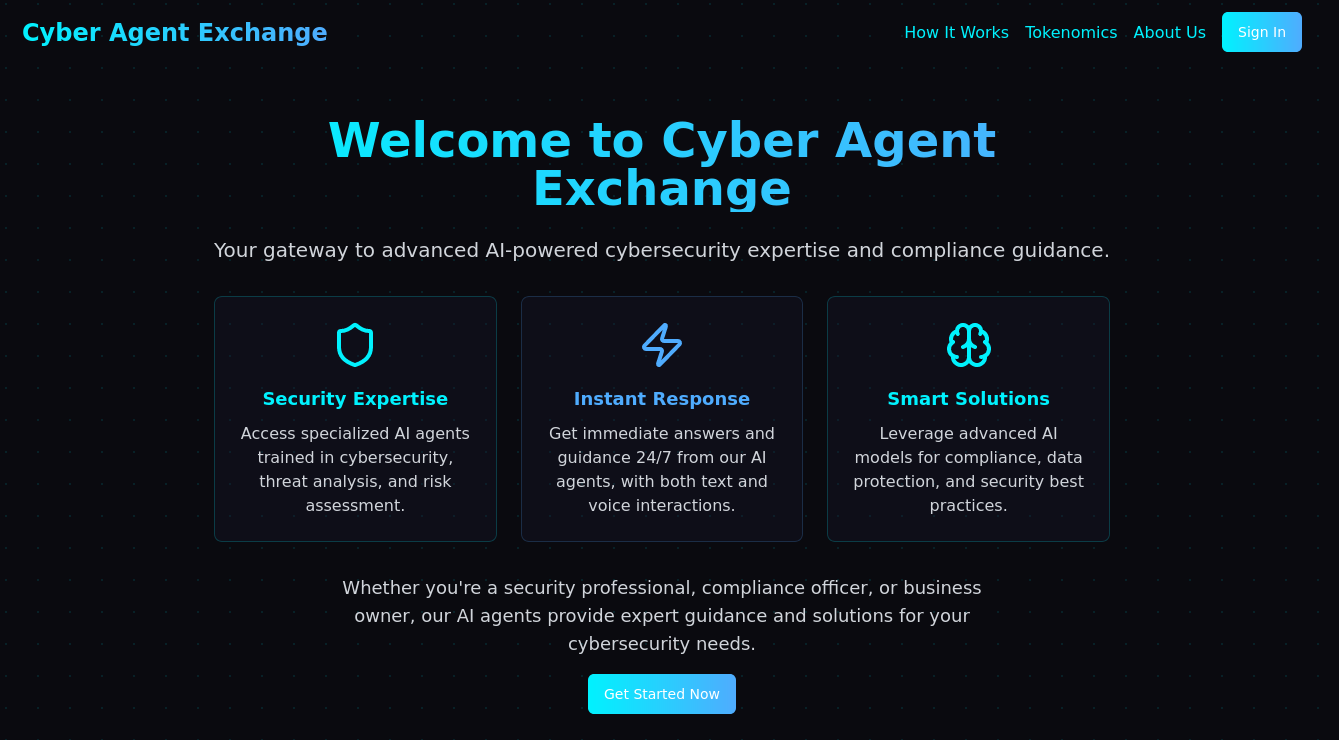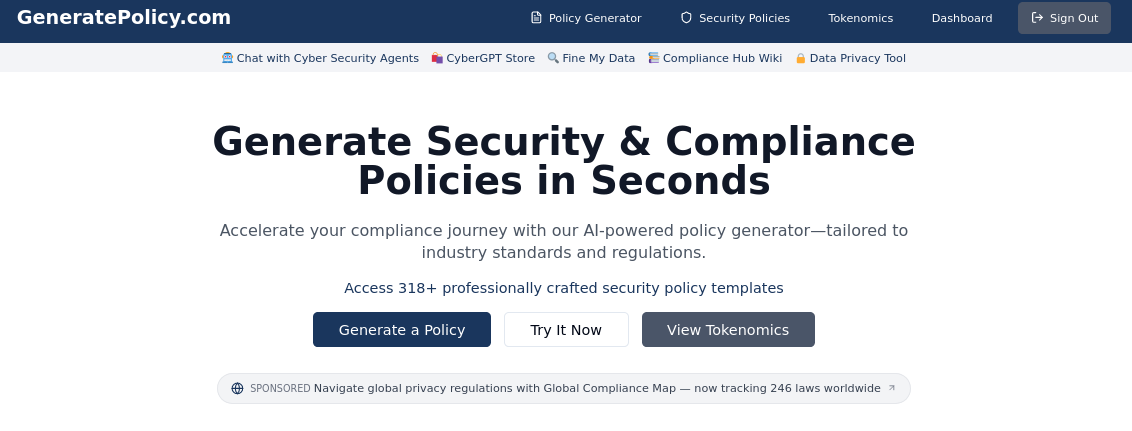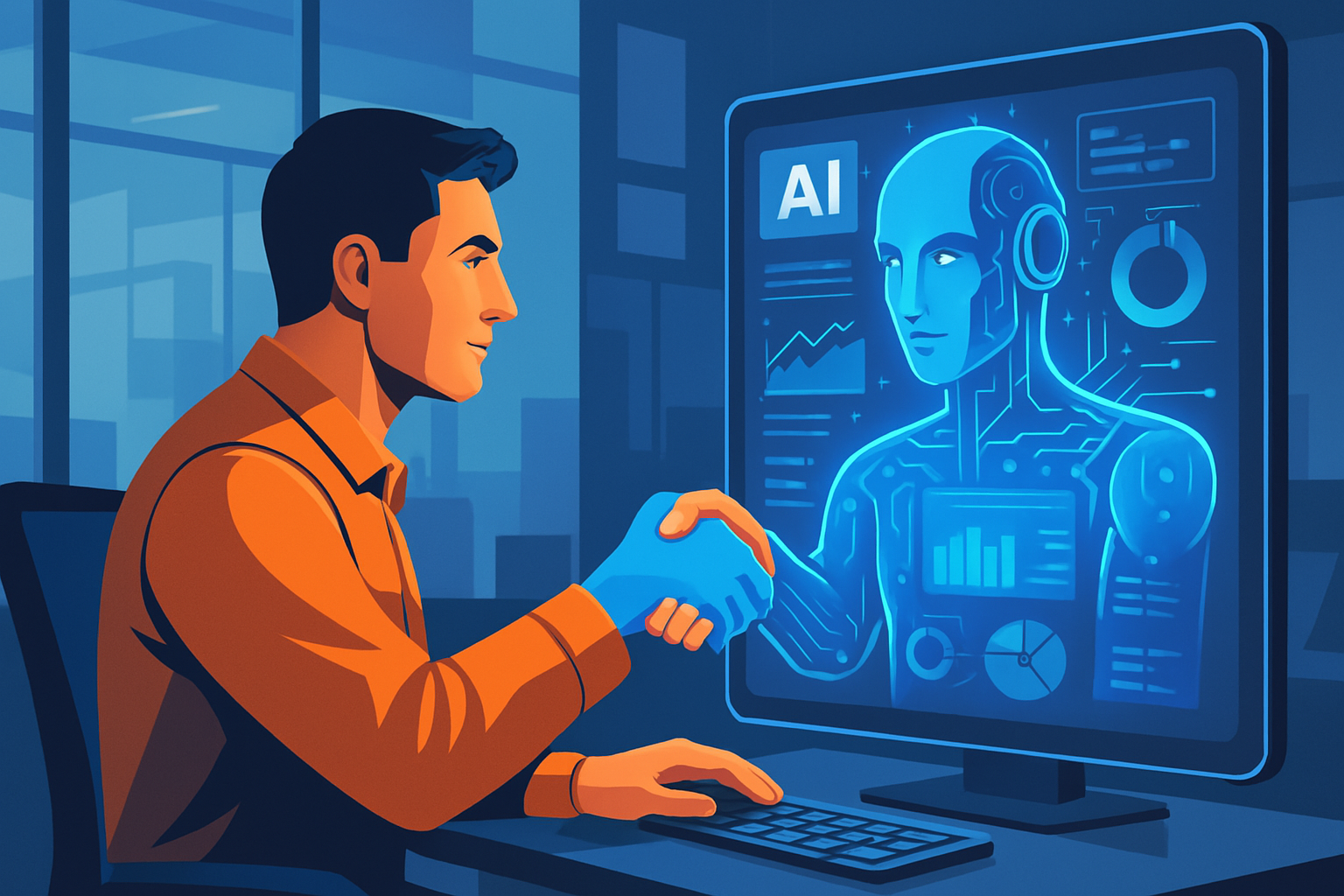The integration of artificial intelligence (AI) into the professional sphere is no longer a futuristic fantasy but a rapidly unfolding reality. While initial perceptions of AI often focused on automation and task substitution, groundbreaking research and the development of sophisticated AI tools are revealing a more nuanced and potentially transformative impact on the very fabric of organizational teamwork. This article delves into how AI is influencing the core pillars of collaboration – performance, expertise sharing, and social engagement – drawing on insights from recent studies and the emergence of innovative AI-driven platforms.
One significant development in this landscape is the unveiling of Microsoft Security Copilot Agents, an AI-driven suite designed to revolutionize cybersecurity operations. These agents leverage human-supervised AI and continuous learning to tackle challenges across security operations, infrastructure management, network administration, and compliance. This highlights the growing recognition of AI’s potential to enhance efficiency and effectiveness in specific operational domains.
However, a more profound understanding of AI’s broader impact on teamwork emerges from “The Cybernetic Teammate.pdf,” a comprehensive field experiment conducted at Procter & Gamble. This study provides compelling evidence that generative AI is not merely augmenting existing workflows but is fundamentally reshaping the nature of collaboration and expertise within organizations.
Overview of Microsoft Security Copilot Agents
The Security Copilot Agents are categorized into distinct operational areas, each tailored to specific tasks. These areas include:
- Security Operations Centre
- Focuses on detecting and responding to threats in real-time.
- Infrastructure & Cloud Administration
- Aims to streamline cloud-based security and infrastructure management.
- Network Operations
- Enhances network security and performance monitoring.
- Device & Client Administration
- Secures endpoints and client devices.
- Identity & Access Administration
- Manages identity and access controls efficiently.
- IT Governance, Risk & Compliance Office
- Ensures adherence to regulatory requirements and mitigates risks.

The AI-Driven Surge in Performance
The traditional justification for teamwork often rests on the premise that collaboration yields higher-quality results than individual work, allowing for the tackling of more complex problems. The findings of “The Cybernetic Teammate.pdf” both validate this and introduce a significant disruption: individuals equipped with generative AI can achieve performance levels that rival, and in some aspects surpass, those of traditional two-person teams working without AI.
[
The Cybernetic Teammate
The Cybernetic Teammate.pdf
2 MB
download-circle](/files/The-Cybernetic-Teammate.pdf)
The P&G experiment revealed that individuals using AI demonstrated a 0.37 standard deviation increase in solution quality compared to those without AI. Remarkably, teams without AI only showed a 0.24 standard deviation improvement over individuals. This suggests that AI empowers individuals to perform at a level comparable to a collaborative unit, effectively acting as a “cybernetic teammate” in boosting individual capabilities.
Furthermore, AI significantly enhances efficiency. Individuals with AI completed their tasks 16.4% faster than the control group. While non-AI teams spent a similar amount of time as individuals without AI, this means that individual AI users were able to produce higher-quality work in significantly less time than non-AI teams.
The study also explored the impact of AI on generating exceptional outcomes. While individual AI users showed a small, statistically insignificant positive effect on producing top 10% solutions, teams augmented with AI were significantly more likely to generate these breakthrough innovations. This underscores the powerful synergy that can emerge when human collaboration is combined with AI assistance, particularly for achieving truly outstanding results.
The Microsoft Security Copilot Agents echo this theme of performance enhancement within the cybersecurity context. Agents like the Phishing Triage Agent automate the identification and mitigation of phishing attempts, reducing response times. Similarly, the Vulnerability Remediation Agent streamlines patch management by identifying vulnerabilities and suggesting remediation steps. These tools exemplify how AI can automate critical tasks and accelerate processes, ultimately improving the performance of security teams. [
Cyber Agent Exchange - AI-Powered Cybersecurity Assistance
Access specialized AI agents for cybersecurity consulting, threat analysis, and security best practices.
AI-Powered Cybersecurity AssistanceCyber Agent Exchange

](https://cyberagent.exchange/)
Breaking Down Silos: AI as an Expertise Democratizer
Another core pillar of teamwork is expertise sharing, where individuals with diverse knowledge come together to solve complex problems. “The Cybernetic Teammate.pdf” provides compelling evidence that AI plays a crucial role in democratizing expertise and breaking down traditional functional silos.
The study observed that without AI, professionals tended to propose solutions heavily influenced by their professional backgrounds. For instance, R&D professionals leaned towards technical solutions, while commercial professionals favored commercially-oriented proposals. However, when individuals used AI, they produced more balanced solutions, irrespective of their functional expertise. This suggests that AI acts as a boundary-spanning mechanism, providing access to a broader range of perspectives and knowledge that enables individuals to think beyond their immediate domain.
This effect was particularly pronounced for employees less familiar with the specific product development tasks (“non-core-job” employees). Without AI, their performance was relatively lower, even in teams. However, when given access to AI, these individuals achieved performance levels comparable to teams with experienced colleagues. This highlights AI’s potential to substitute for the expertise and guidance traditionally provided by more experienced team members, effectively leveling the playing field and empowering a wider range of employees to contribute meaningfully to complex tasks.
The Unexpected Social Engagement: AI and Emotional Resonance
Beyond performance and expertise, human sociality plays a vital role in teamwork, fostering motivation and job satisfaction. Contrary to some concerns that AI might dehumanize the workplace, “The Cybernetic Teammate.pdf” uncovered a surprising trend: AI’s language-based interaction led to more positive self-reported emotional responses among users.
Participants using AI reported significantly higher levels of positive emotions such as enthusiasm, energy, and excitement, and lower levels of negative emotions like anxiety and frustration. Notably, individuals working with AI experienced positive emotional responses that matched or even exceeded those of team members working without AI. This suggests that AI can fulfill some of the social and motivational roles traditionally associated with human teammates, offering a sense of partnership and support even in individual work settings. These findings align with emerging research on the positive psychological effects of conversational AI.
Beyond a Tool: Embracing the Cybernetic Teammate
The research from “The Cybernetic Teammate.pdf” compellingly argues that generative AI is evolving beyond a mere tool and is beginning to function as a “cybernetic teammate”. This concept, drawing from cybernetics theory, emphasizes the dynamic interaction and feedback loops between humans and AI systems.
By providing real-time feedback, bridging cross-functional expertise, and even influencing emotional states, AI is occupying roles traditionally held by human collaborators. While AI cannot fully replicate the nuances of human social and emotional interaction, its ability to contribute meaningfully to ideation, problem-solving, and even emotional well-being signifies a fundamental shift in how knowledge work can be structured and executed. This perspective aligns with broader theories that view AI as an active “counterpart” within socio-technical systems, shaping and being shaped by human actors and organizational infrastructures. [
GeneratePolicy.com - AI Security Policy Generator
Generate comprehensive security policies instantly with AI. Tailored for HIPAA, GDPR, ISO 27001, and industry-specific compliance requirements.
GeneratePolicy.com

](https://generatepolicy.com/)
Implications for Organizations and the Future of Work
The findings discussed have significant implications for organizational design and the future of work. The ability of AI-enabled individuals to perform at the level of non-AI teams suggests that organizations may need to rethink optimal team sizes and compositions, potentially leading to more flexible and efficient structures. However, the enhanced potential of AI-augmented teams for generating top-tier innovations also highlights the continued importance of human collaboration in certain contexts.
The increased speed and comprehensiveness of AI-enabled work, as evidenced by longer solutions produced in less time, necessitate a re-evaluation of work processes and deliverable expectations. Organizations must also invest in developing their employees’ AI interaction capabilities, recognizing this as an increasingly critical skill. Furthermore, given AI’s capacity to break down silos, training that encourages broader, cross-functional thinking will be invaluable.
The research also opens several avenues for future exploration. Understanding how the benefits of AI evolve with user experience, identifying the specific AI features that best support knowledge integration, and developing best practices for AI-enabled work are crucial next steps. Additionally, investigating the long-term impact of AI on domain expertise development is essential.
Conclusion: A New Era of Collaborative Intelligence
The evidence presented in “The Cybernetic Teammate.pdf,” coupled with the development of tools like Microsoft Security Copilot Agents, signals a paradigm shift in organizational collaboration. AI is no longer simply automating tasks; it is actively participating in the collaborative process, enhancing individual capabilities, democratizing expertise, and even fostering positive emotional connections.
By understanding and embracing the role of AI as a “cybernetic teammate,” organizations can unlock new levels of performance, foster more holistic problem-solving, and create more engaging and productive work environments. As AI technologies continue to evolve, a deeper understanding of the dynamic interplay between human and artificial intelligence will be critical for navigating this new era of collaborative intelligence and shaping the future of work.
